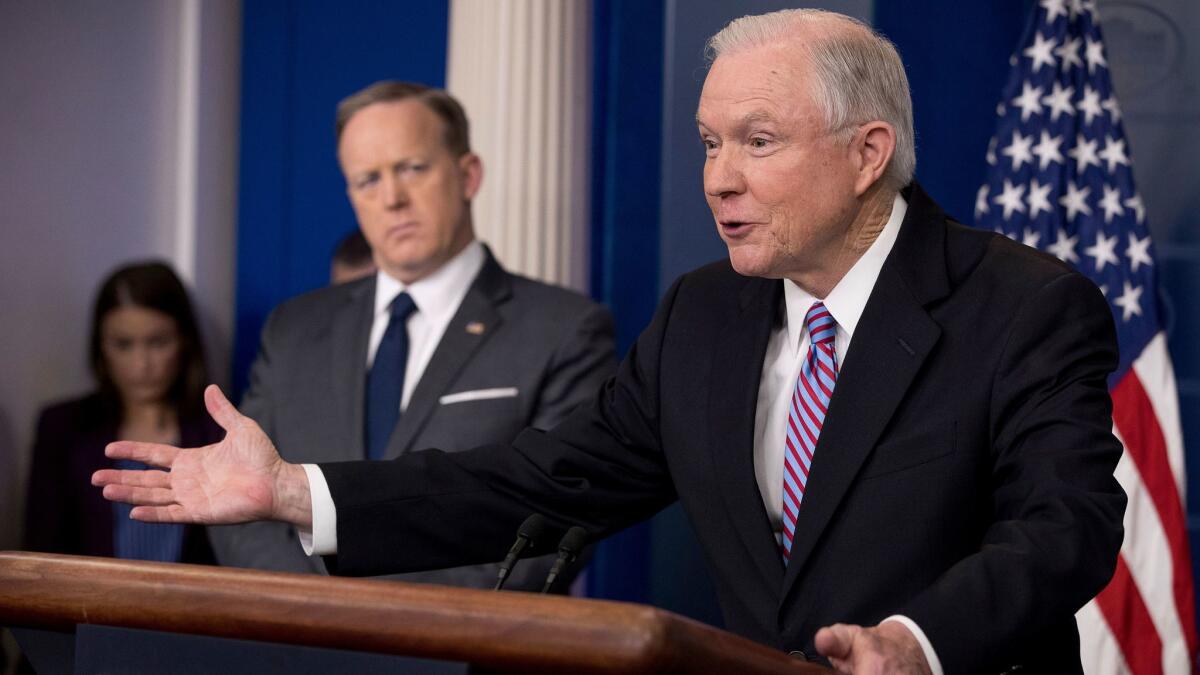Column: Here’s what Atty. Gen. Sessions got wrong about the law in his attack on sanctuary cities

U.S. Atty. Gen. Jeff Sessions sounded passionate, wrathful and confident when he appeared at the White House press room Monday to deliver a blistering attack on sanctuary jurisdictions across the nation.
States and cities that thwart the federal government’s policies against illegal immigrants, Sessions said, would face severe consequences. He talked as though jurisdictions across the nation were actively violating federal immigration laws, pumping undocumented immigrants back onto the streets even after their convictions for serious crimes.
Sessions threatened to withhold or terminate federal grants from cities that do so or declare them ineligible for future funding. He even threatened to “claw back” funds that already have been advanced.
“Unfortunately, some states and cities have adopted policies designed to frustrate the enforcement of immigration laws,” he said. “Failure to deport aliens who are convicted of criminal offenses puts whole communities at risk.”
Sanctuary cities are saying, ‘We want every member of the community to trust us, and that can be only if we’re not viewed as partners of ICE.’
— Bill Ong Hing, University of San Francisco law school
These were strong words, but legal experts say they’d be stronger if they more accurately reflected the true nature of many sanctuary policies, the limits of their required compliance with federal law, and the reasons that many have been adopted.
Sessions’ remarks aimed to expand on a Jan. 25 executive order by President Trump that put sanctuary jurisdictions squarely in the administration’s crosshairs. “Sanctuary jurisdictions across the United States willfully violate Federal law in an attempt to shield aliens from removal from the United States,” the order said. “These jurisdictions have caused immeasurable harm to the American people and to the very fabric of our Republic.” The order required the Department of Justice and other agencies to “ensure that jurisdictions that fail to comply with applicable Federal law do not receive Federal funds, except as mandated by law.”
Sessions’ statement was felt especially strongly in California, where the federal Immigration and Customs Enforcement agency has identified at least 19 “non-cooperative” counties and cities. Legislation under consideration in Sacramento would bar police statewide from enforcing federal immigration law.
“Instead of making us safer, the Trump administration is spreading fear and promoting race-based scapegoating,” Senate President Pro Tem Kevin de León said after the Sessions statement.
There are several problems with Trump’s words, and Sessions’. To begin with, Trump misrepresents the rationale for sanctuary policies in many jurisdictions. They’re not designed specifically to “shield aliens” from deportation, but rather to create a working relationship between the police and the communities they serve.
Nor, as Los Angeles Mayor Eric Garcetti has observed, is there any legal definition of the term “sanctuary city.” There are almost as many variations of “sanctuary” policies as the jurisdictions themselves, with wide variations on the conditions under which local law enforcement will handle requests for assistance from immigration authorities.
Three California municipalities — San Francisco, Santa Clara, and Richmond — already have filed lawsuits challenging the legality of Trump’s executive order. “This is all politics, aiming to divide people,” says Joseph Cotchett, who represents Richmond in a lawsuit filed last week in San Francisco federal court. The lawsuit calls the order an unconstitutional effort to “coerce” Richmond into enforcing federal immigration law.
“Sanctuary cities are saying, ‘We want every member of the community to trust us, and that can be only if we’re not viewed as partners of ICE,’” says Bill Ong Hing, a law professor and expert in immigration law at the University of San Francisco. And since police powers are understood under federal case law to be specifically reserved to the states, that’s a high bar for the federal government to overcome.
That points to some important flaws in the government’s insistence that sanctuary policies necessarily violate federal laws. Defenders of states and cities point to the 10th Amendment, which has been widely interpreted as protecting state and local law enforcement agencies from being “commandeered” by the federal government to enforce federal law — such as immigration law. That places serious limits on the government’s ability to demand cooperation from localities for immigration sweeps or even detention of suspected undocumented immigrants.
Moreover, as experts at the Congressional Research Service observed in 2015, rounding up suspected illegal immigrants for possible deportation doesn’t even amount to enforcement of a criminal statute: deporting aliens for being in the country in violation of immigration rules is “a civil action, rather than a criminal sanction, because the main purpose is not to punish wrongdoing but to end a continuing violation of the nation’s immigration laws,” they wrote — making even more questionable the dragooning of local police into such work.
Sessions spent a lot of time Monday on the supposed thwarting of two aspects of federal law, “Section 1373” and immigration detainers. The first, enacted in 1996 under Bill Clinton, is a section of the federal code that prohibits anyone from interfering with the exchange of information with federal authorities about the immigration status of any person.
Nothing in the law, however, requires local officials to collect information about the immigration status of anyone they have in custody. It says merely that once local officials have that information, they can’t be stopped from trading it to the feds. Hing says this points to a “don’t ask, don’t tell,” policy. The Los Angeles Police Department’s Special Order 40 policy, which dates to 1979, bans police actions aimed solely at determining anyone’s immigration status — “don’t ask.” But federal law protects local officials who are aware of someone’s immigration status and wish to tell the feds. Hing says such policies are almost certainly protected from federal attack.
“Detainers” are requests by immigration officials that local police hold suspected illegal immigrants suspected or accused of a serious crime for 48 hours, or until the immigration authorities can decide if they want to take further action themselves. The CRS found that local policies vary widely about when to honor detainers, with many honoring those for people held for serious felonies but not for suspects in minor misdemeanor cases. Some require commitments from the federal government to cover the cost of detention or even the locality’s legal liability. Demanding compliance with all detainers, some experts say, raises the possibility of unconstitutional commandeering of local resources.
Sessions’ assertion that resisting detainers puts communities at risk by allowing violent criminals to go free is highly dubious. Police who have suspects in major crimes in custody aren’t likely to let them go free just because they’re undocumented. “We hand over dangerous criminals to our immigration officials,” Garcetti told CNN earlier this year. “But, but we don’t do that without a warrant or without a constitutional process, just based on the way somebody looks or where they live or who they are.”
As Hing explains, “a detainer is an allegation that someone is deportable. It’s a violation of the 5th Amendment to be detained without reasonable suspicion.”
The most questionable aspect of Sessions’ statement is his threat to end funding for supposed sanctuary jurisdictions, deny them grants, or even claw back already disbursed dollars. Cotchett maintains that it’s unconstitutional to impose new conditions on already-appropriated federal funds. In any event, the funding programs at issue are created by Congress, not the executive branch. “What makes Sessions think that he can override Congress?” he asks.
Congress could impose conditions on future funding, but its authority to do so is also constitutionally limited; any conditions have to be “germane” to the purpose of the funding, Hing says. That means that Congress conceivably could predicate law-enforcement funds, say, on local cooperation with immigration enforcement. But the Trump executive order’s implication that a wide variety of federal funds might be denied to sanctuary jurisdictions is probably unconstitutional. As for clawing back existing grants, Hing says that retroactive rule-making is clearly out of bounds. “It’s too late for that.”
He cites New Haven, Conn., which has a heavily Latino population and thousands of undocumented residents, and where police are forbidden to ask crime victims, witnesses or anyone seeking assistance from an officer about their immigration status. Since the policy was put in place, local officials say, cooperation with police has “increased dramatically.”
Even taking away law-enforcement funding from local jurisdictions would be counterproductive, since much of the funding pays for equipment and training for community policing. But that’s a lesson that seems to have escaped Sessions and Trump: The essence of making communities safe is to improve the relationship of the policed with the police, rather than making crime victims and witnesses as fearful of the knock on the door as criminals are.
Keep up to date with Michael Hiltzik. Follow @hiltzikm on Twitter, see his Facebook page, or email michael.hiltzik@latimes.com.
Return to Michael Hiltzik’s blog.
More to Read
Inside the business of entertainment
The Wide Shot brings you news, analysis and insights on everything from streaming wars to production — and what it all means for the future.
You may occasionally receive promotional content from the Los Angeles Times.







